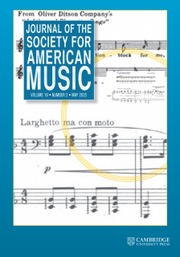Article contents
The Vocal Ecology of Crumb's Crickets
Published online by Cambridge University Press: 21 June 2013
Abstract
Making sound is characteristic of agency in the natural world. It is curious therefore that having separated pitched sound from nature as much as possible—disciplined it into scales, temperaments, etc.—Western music has for centuries made extraordinary efforts to imitate natural sounds and processes with this un-natured sound. Whereas music often depicts nature, “music” has become abstract and transparent, and musical sounds themselves have become little more than acoustic tokens of objects related by structure. Any metaphorical connections with extra-musical sounds are suppressed in discourse about music because they constitute “effects.” In this article, I interpret the first movement of George Crumb's Ancient Voices of Children (1970) as an expression of agency in the soundscape, considering vocal sounds, especially those attributed to crickets, as acts in a vocal ecology rather than imitation of natural sounds for programmatic purposes. My analysis invites us to hear this music—and music in general—as acoustic expression in a soundscape and therefore in ecological terms.
- Type
- Research Article
- Information
- Copyright
- Copyright © The Society for American Music 2013
References
- 4
- Cited by


